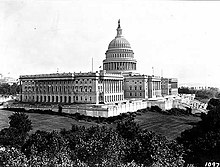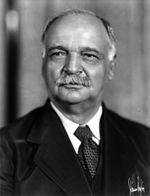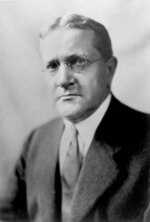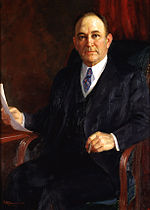71st United States Congress
| 71st United States Congress | |
|---|---|
70th ← → 72nd | |
 United States Capitol (1906) | |
| March 4, 1929 – March 4, 1931 | |
| Senate President | Charles Curtis (R) |
| Senate Pres. pro tem | George H. Moses (R) |
| House Speaker | Nicholas Longworth (R) |
| Members | 96 senators 435 representatives 5 non-voting delegates |
| Senate Majority | Republican |
| House Majority | Republican |
| Sessions | |
Special: March 4, 1929 – March 5, 1929 1st: April 15, 1929 – November 22, 1929 2nd: December 2, 1929 – July 3, 1930 Special: July 7, 1930 – July 21, 1930 3rd: December 1, 1930 – March 3, 1931 | |
The Seventy-first United States Congress was a meeting of the legislative branch of the United States federal government, consisting of the United States Senate and the United States House of Representatives. It met in Washington, D.C. from March 4, 1929, to March 4, 1931, during the first two years of Herbert Hoover's presidency. The apportionment of seats in the House of Representatives was based on the Thirteenth Decennial Census of the United States in 1910. Both chambers had a Republican majority. This congress saw the most special elections of any congress with 27 in all.
Contents
1 Major events
2 Major legislation
3 Party summary
3.1 Senate
3.2 House of Representatives
4 Leadership
4.1 Senate
4.2 House of Representatives
5 Members
5.1 Senate
5.1.1 Alabama
5.1.2 Arizona
5.1.3 Arkansas
5.1.4 California
5.1.5 Colorado
5.1.6 Connecticut
5.1.7 Delaware
5.1.8 Florida
5.1.9 Georgia
5.1.10 Idaho
5.1.11 Illinois
5.1.12 Indiana
5.1.13 Iowa
5.1.14 Kansas
5.1.15 Kentucky
5.1.16 Louisiana
5.1.17 Maine
5.1.18 Maryland
5.1.19 Massachusetts
5.1.20 Michigan
5.1.21 Minnesota
5.1.22 Mississippi
5.1.23 Missouri
5.1.24 Montana
5.1.25 Nebraska
5.1.26 Nevada
5.1.27 New Hampshire
5.1.28 New Jersey
5.1.29 New Mexico
5.1.30 New York
5.1.31 North Carolina
5.1.32 North Dakota
5.1.33 Ohio
5.1.34 Oklahoma
5.1.35 Oregon
5.1.36 Pennsylvania
5.1.37 Rhode Island
5.1.38 South Carolina
5.1.39 South Dakota
5.1.40 Tennessee
5.1.41 Texas
5.1.42 Utah
5.1.43 Vermont
5.1.44 Virginia
5.1.45 Washington
5.1.46 West Virginia
5.1.47 Wisconsin
5.1.48 Wyoming
5.2 House of Representatives
5.2.1 Alabama
5.2.2 Arizona
5.2.3 Arkansas
5.2.4 California
5.2.5 Colorado
5.2.6 Connecticut
5.2.7 Delaware
5.2.8 Florida
5.2.9 Georgia
5.2.10 Idaho
5.2.11 Illinois
5.2.12 Indiana
5.2.13 Iowa
5.2.14 Kansas
5.2.15 Kentucky
5.2.16 Louisiana
5.2.17 Maine
5.2.18 Maryland
5.2.19 Massachusetts
5.2.20 Michigan
5.2.21 Minnesota
5.2.22 Mississippi
5.2.23 Missouri
5.2.24 Montana
5.2.25 Nebraska
5.2.26 Nevada
5.2.27 New Hampshire
5.2.28 New Jersey
5.2.29 New Mexico
5.2.30 New York
5.2.31 North Carolina
5.2.32 North Dakota
5.2.33 Ohio
5.2.34 Oklahoma
5.2.35 Oregon
5.2.36 Pennsylvania
5.2.37 Rhode Island
5.2.38 South Carolina
5.2.39 South Dakota
5.2.40 Tennessee
5.2.41 Texas
5.2.42 Utah
5.2.43 Vermont
5.2.44 Virginia
5.2.45 Washington
5.2.46 West Virginia
5.2.47 Wisconsin
5.2.48 Wyoming
5.2.49 Non-voting members
6 Changes in membership
6.1 Senate
6.2 House of Representatives
7 Committees
7.1 Senate
7.2 House of Representatives
7.3 Joint committees
8 Caucuses
9 Officers
9.1 Senate
9.2 House of Representatives
10 See also
11 Notes
12 References
13 External links
Major events
- March 4, 1929: Herbert C. Hoover became President of the United States
- October 24, 1929 – October 29, 1929: Wall Street Crash of 1929: Three multi-digit percentage drops wipe out more than $30 billion from the New York Stock Exchange (3 times greater than the annual budget of the federal government).
- October 25, 1929: Former U.S. Interior Secretary Albert B. Fall is convicted of bribery for his role in the Teapot Dome scandal, becoming the first Presidential cabinet member to go to prison for actions in office.
Major legislation
- June 15, 1929: Agriculture Marketing Act, ch. 24, 46 Stat. 11
- June 18, 1929: Reapportionment Act of 1929, ch. 28, 46 Stat. 21
- June 17, 1930: Hawley-Smoot Tariff Act, ch. 497, 46 Stat. 590, (including: Title III, Plant Patent Act, 46 Stat. 703)
- March 3, 1931: Davis–Bacon Act, ch. 411, 46 Stat. 1494
Party summary

Map showing Senate party membership at the start of the 71st Congress.
The count below identifies party affiliations at the beginning of the first session of this Congress, and includes members from vacancies and newly admitted states, when they were first seated. Changes resulting from subsequent replacements are shown below in the "Changes in membership" section.
Senate
| Party (shading shows control) | Total | Vacant | |||
|---|---|---|---|---|---|
Democratic (D) | Farmer-Labor (FL) | Republican (R) | |||
| End of the previous congress | 45 | 1 | 50 | 96 | 0 |
| Begin | 39 | 1 | 55 | 95 | 1 |
| End | 41 | 54 | 96 | 0 | |
| Final voting share | 7001427000000000000♠42.7% | 7000100000000000000♠1.0% | 7001563000000000000♠56.3% | ||
| Beginning of the next congress | 59 | 1 | 36 | 96 | 0 |
House of Representatives
| Party (shading shows control) | Total | Vacant | |||
|---|---|---|---|---|---|
Democratic (D) | Farmer–Labor (FL) | Republican (R) | |||
| End of the previous congress | 203 | 5 | 219 | 427 | 7 |
| Begin | 164 | 1 | 270 | 435 | 0 |
| End | 165 | 269 | |||
| Final voting share | 7001379000000000000♠37.9% | 6999200000000000000♠0.2% | 7001618000000000000♠61.8% | ||
| Beginning of the next congress | 215 | 1 | 218 | 434 | 1 |
Leadership
Senate

President of the Senate
Charles Curtis

President pro tempore of the Senate
George H. Moses
President: Charles Curtis (R)
President pro tempore: George H. Moses (R)
Majority leader: James E. Watson (R)
Minority leader: Joseph T. Robinson (D)
Majority whip: Simeon D. Fess (R)
Minority whip: Morris Sheppard (D)
Republican Conference Secretary: Frederick Hale (R)
Democratic Caucus Secretary: Hugo Black (D)
House of Representatives
Speaker: Nicholas Longworth (R)
Majority leader: John Q. Tilson (R)
Minority leader: John N. Garner (D)
Minority Whip: Albert Henry Vestal (R)
Minority Whip: John McDuffie (D)
Republican Conference Chair: Willis C. Hawley
Democratic Caucus Chairman: David Hayes Kincheloe
Democratic Campaign Committee Chairman: Joseph W. Byrns Sr.
Members
This list is arranged by chamber, then by state. Senators are listed in order of seniority, and Representatives are listed by district.
Senate
Senators were elected every two years, with one-third beginning new six-year terms with each Congress. Preceding the names in the list below are Senate class numbers, which indicate the cycle of their election. In this Congress, Class 1 meant their term began in this Congress, requiring reelection in 1934; Class 2 meant their term ended with this Congress, requiring reelection in 1930; and Class 3 meant their term began in the last Congress, requiring reelection in 1932.
|
|  Senate Majority leader James E. Watson  Senate Minority leader Joseph T. Robinson |
House of Representatives
The names of members of the House of Representatives are preceded by their districts.
|
| 
 Speaker of the House Nicholas Longworth  Majority leader of the House John Tilson  Minority leader of the House John Garner | ||||||||
Changes in membership
The count below reflects changes from the beginning of the first session of this Congress.
Senate
- replacements: 9
Democratic: 1-seat net gain
Republican: 1-seat net loss
- Deaths: 5
- Resignations: 3
- Interim appointments: 6
- Total seats with changes: 9
| State | Senator | Reason for Vacancy | Successor | Date of Successor's Installation |
|---|---|---|---|---|
Kansas (3) | Vacant | Charles Curtis (R) had resigned at end of previous congress to become Vice President of the United States. Successor appointed April 1, 1929, to continue the term. | Henry J. Allen (R) | April 1, 1929 |
Pennsylvania (3) | Vacant | Sen.-elect William S. Vare (R) was apparently elected but vote was never certified by the Governor due to election irregularities. The Senate refused to qualify him and he was formally unseated December 9, 1929. Successor appointed December 11, 1929. Successor later lost nomination to finish the term, see below. | Joseph R. Grundy (R) | December 11, 1929 |
Tennessee (2) | Lawrence Tyson (D) | Died August 24, 1929. Successor appointed September 2, 1929, to continue the term. Successor was also later elected November 4, 1930, to finish the term.[2] | William E. Brock (D) | September 2, 1929 |
Ohio (3) | Theodore E. Burton (R) | Died October 28, 1929. Successor appointed November 5, 1929, to continue the term. Successor later lost election to finish the term, see below. | Roscoe C. McCulloch (R) | November 5, 1929 |
New Jersey (2) | Walter E. Edge (R) | Resigned November 21, 1929, to become U.S. Ambassador to France. Successor appointed November 30, 1929, to continue the term. Successor later did not run to finish the term, see below. | David Baird, Jr. (R) | November 30, 1929 |
Wyoming (2) | Francis E. Warren (R) | Died November 24, 1929. Successor appointed December 5, 1929. Successor later did not run to finish the term, see below. | Patrick J. Sullivan (R) | December 5, 1929 |
Kentucky (2) | Frederic M. Sackett (R) | Resigned January 9, 1930, to become U.S. Ambassador to Germany. Successor appointed January 11, 1930, to continue the term. Successor later lost election to finish the term, see below. | John M. Robsion (R) | January 11, 1930 |
Wyoming (2) | Patrick Joseph Sullivan (R) | Interim appointee did not run to finish the term. Successor elected November 4, 1930. | Robert D. Carey (R) | December 1, 1930 |
Kansas (3) | Henry J. Allen (R) | Interim appointee lost election to finish the term. Successor elected November 4, 1930. | George McGill (D) | December 1, 1930 |
Kentucky (2) | John M. Robsion (R) | Interim appointee lost election to finish the term. Successor elected November 4, 1930. | Ben M. Williamson (D) | December 1, 1930 |
Ohio (3) | Roscoe C. McCulloch (R) | Interim appointee lost election to finish the term. Successor elected November 4, 1930. | Robert J. Bulkley (D) | December 1, 1930 |
Pennsylvania (3) | Joseph R. Grundy (R) | Interim appointee lost nomination to finish the term. Successor elected November 4, 1930. | James J. Davis (R) | December 2, 1930 |
New Jersey (2) | David Baird, Jr. (R) | Interim appointee did not run to finish the term. Successor elected November 4, 1930. | Dwight Morrow (R) | December 3, 1930 |
North Carolina (3) | Lee S. Overman (D) | Died December 12, 1930. Successor appointed December 13, 1930, to continue the term. Successor later lost election to finish the term, see (72nd United States Congress). | Cameron A. Morrison (D) | December 13, 1930 |
Vermont (1) | Frank L. Greene (R) | Died December 17, 1930. Successor appointed December 23, 1930, to continue the term. Successor later lost nomination to finish the term, see (72nd United States Congress). | Frank C. Partridge (R) | December 23, 1930 |
House of Representatives
- replacements: 27
Democratic: 4 seat net gain
Republican: 3 seat net loss
- deaths: 25
- resignations: 6
- contested election: 1
- Total seats with changes: 32
| District | Vacator | Reason for Vacancy | Successor | |
|---|---|---|---|---|
New York 21st | Vacant | Rep. Royal H. Weller died during previous congress | Joseph A. Gavagan (D) | November 5, 1929 |
Illinois 15th | Vacant | Rep. Edward J. King died in previous congress | Burnett M. Chiperfield (R) | November 4, 1930 |
Kentucky 3rd | Charles W. Roark (R) | Died April 5, 1929 | John W. Moore (D) | June 1, 1929 |
Louisiana 3rd | Whitmell P. Martin (D) | Died April 6, 1929 | Numa F. Montet (D) | August 6, 1929 |
Pennsylvania 12th | John J. Casey (D) | Died May 5, 1929 | Charles M. Turpin (R) | June 1, 1929 |
Minnesota 5th | Walter Newton (R) | Resigned June 30, 1929, after being appointed secretary to President Herbert Hoover | William I. Nolan (R) | July 17, 1929 |
Georgia 5th | Leslie J. Steele (D) | Died July 24, 1929 | Robert Ramspeck (D) | October 2, 1929 |
Minnesota 7th | Ole J. Kvale (FL) | Died September 11, 1929 | Paul J. Kvale (FL) | October 16, 1929 |
New York 18th | John F. Carew (D) | Resigned December 28, 1929, after being appointed a justice to the New York Supreme Court | Martin J. Kennedy (D) | April 11, 1930 |
Illinois 24th | Thomas S. Williams (R) | Resigned November 11, 1929, after being appointed to the United States Court of Claims | Claude V. Parsons (D) | November 4, 1930 |
Pennsylvania 10th | William W. Griest (R) | Died December 5, 1929 | J. Roland Kinzer (R) | January 28, 1930 |
Massachusetts 2nd | Will Kirk Kaynor (R) | Died December 20, 1929 | William J. Granfield (D) | February 17, 1930 |
Utah 2nd | Elmer O. Leatherwood (R) | Died December 24, 1929 | Frederick C. Loofbourow (R) | November 4, 1930 |
Kentucky 11th | John M. Robsion (R) | Resigned January 10, 1930, after being appointed to the U.S. Senate | Charles Finley (R) | February 15, 1930 |
Texas 14th | Augustus McCloskey (D) | Lost contested election February 10, 1930 | Harry M. Wurzbach (R) | February 10, 1930 |
West Virginia 4th | James A. Hughes (R) | Died March 2, 1930 | Robert L. Hogg (R) | November 4, 1930 |
Connecticut 5th | James P. Glynn (R) | Died March 6, 1930 | Edward W. Goss (R) | November 4, 1930 |
Texas 17th | Robert Q. Lee (D) | Died April 18, 1930 | Thomas L. Blanton (D) | May 20, 1930 |
Rhode Island 3rd | Jeremiah E. O'Connell (D) | Resigned May 9, 1930, after being appointed a justice to the Rhode Island Superior Court | Francis Condon (D) | November 4, 1930 |
Wisconsin 6th | Florian Lampert (R) | Died July 18, 1930 | Michael Reilly (D) | November 4, 1930 |
Pennsylvania 32nd | Edgar R. Kiess (R) | Died July 20, 1930 | Robert F. Rich (R) | November 4, 1930 |
Pennsylvania 16th | Stephen G. Porter (R) | Died June 27, 1930 | Edmund F. Erk (R) | November 4, 1930 |
North Carolina 5th | Charles M. Stedman (D) | Died September 23, 1930 | Franklin W. Hancock, Jr. (D) | November 4, 1930 |
North Carolina 7th | William C. Hammer (D) | Died September 26, 1930 | Hinton James (D) | November 4, 1930 |
Kentucky 2nd | David H. Kincheloe (D) | Resigned October 5, 1930, after being appointed to the United States Customs Court | John L. Dorsey, Jr. (D) | November 4, 1930 |
California 3rd | Charles F. Curry (R) | Died October 10, 1930 | Seat remained vacant until next Congress | |
Arkansas 4th | Otis Wingo (D) | Died October 21, 1930 | Effiegene Locke Wingo (D) | November 4, 1930 |
New York 7th | John Quayle (D) | Died November 27, 1930 | Seat remained vacant until next Congress | |
New York 9th | David J. O'Connell (D) | Died December 29, 1930 | Stephen A. Rudd (D) | February 17, 1931 |
Wisconsin 1st | Henry A. Cooper (R) | Died March 1, 1931 | Seat remained vacant until next Congress | |
Committees
Lists of committees and their party leaders, for members (House and Senate) of the committees and their assignments, go into the Official Congressional Directory at the bottom of the article and click on the link, in the directory after the pages of terms of service, you will see the committees of the Senate, House (Standing with Subcommittees, Select and Special) and Joint and after the committee pages, you will see the House/Senate committee assignments in the directory, on the committees section of the House and Senate in the Official Congressional Directory, the committee's members on the first row on the left side shows the chairman of the committee and on the right side shows the ranking member of the committee.
|
|
Joint committees
Conditions of Indian Tribes (Special)- Disposition of (Useless) Executive Papers
- Investigate Control of Aircraft for Seacoast Defense
- Taxation
Caucuses
Democratic (House)
Democratic (Senate)
Officers
Architect of the Capitol: David Lynn
Attending Physician of the United States Congress: George Calver
Comptroller General of the United States: John R. McCarl
Librarian of Congress: Herbert Putnam
Public Printer of the United States: George H. Carter
Senate
Secretary: Edwin P. Thayer
Sergeant at Arms: David S. Barry
Chaplain: ZeBarney T. Phillips (Episcopalian)
Democratic Party Secretary: Edwin A. Halsey
Republican Party Secretary: Carl A. Loeffler
House of Representatives
Clerk: William T. Page
Sergeant at Arms: Joseph G. Rodgers
Doorkeeper: Bert W. Kennedy
Postmaster: Frank W. Collier
Parliamentarian: Lewis Deschler
Reading Clerks: Patrick Joseph Haltigan (D) and N/A (R)
Chaplain: James S. Montgomery (Methodist)
See also
United States elections, 1928 (elections leading to this Congress)
- United States presidential election, 1928
- United States Senate elections, 1928
- United States House of Representatives elections, 1928
United States elections, 1930 (elections during this Congress, leading to the next Congress)
- United States Senate elections, 1930
- United States House of Representatives elections, 1930
Notes
^ William S. Vare (R-PA) had been elected to the Senate for the term starting March 4, 1927, but the Senate had refused to qualify him due to charges of corruption and fraud concerning his election. The Senate finally unseated him on December 9, 1929. See http://bioguide.congress.gov/scripts/biodisplay.pl?index=V000071
^ Byrd, p. 171.
References
Byrd, Robert C. (October 1, 1993). Wolff, Wendy, ed. The Senate, 1789-1989: Historical Statistics, 1789-1992. United States Senate Historical Office (volume 4 Bicentennial ed.). Washington, D.C.: U.S. Government Printing Office..mw-parser-output cite.citation{font-style:inherit}.mw-parser-output q{quotes:"""""""'""'"}.mw-parser-output code.cs1-code{color:inherit;background:inherit;border:inherit;padding:inherit}.mw-parser-output .cs1-lock-free a{background:url("//upload.wikimedia.org/wikipedia/commons/thumb/6/65/Lock-green.svg/9px-Lock-green.svg.png")no-repeat;background-position:right .1em center}.mw-parser-output .cs1-lock-limited a,.mw-parser-output .cs1-lock-registration a{background:url("//upload.wikimedia.org/wikipedia/commons/thumb/d/d6/Lock-gray-alt-2.svg/9px-Lock-gray-alt-2.svg.png")no-repeat;background-position:right .1em center}.mw-parser-output .cs1-lock-subscription a{background:url("//upload.wikimedia.org/wikipedia/commons/thumb/a/aa/Lock-red-alt-2.svg/9px-Lock-red-alt-2.svg.png")no-repeat;background-position:right .1em center}.mw-parser-output .cs1-subscription,.mw-parser-output .cs1-registration{color:#555}.mw-parser-output .cs1-subscription span,.mw-parser-output .cs1-registration span{border-bottom:1px dotted;cursor:help}.mw-parser-output .cs1-hidden-error{display:none;font-size:100%}.mw-parser-output .cs1-visible-error{font-size:100%}.mw-parser-output .cs1-subscription,.mw-parser-output .cs1-registration,.mw-parser-output .cs1-format{font-size:95%}.mw-parser-output .cs1-kern-left,.mw-parser-output .cs1-kern-wl-left{padding-left:0.2em}.mw-parser-output .cs1-kern-right,.mw-parser-output .cs1-kern-wl-right{padding-right:0.2em}
Martis, Kenneth C. (1989). The Historical Atlas of Political Parties in the United States Congress. New York: Macmillan Publishing Company.
Martis, Kenneth C. (1982). The Historical Atlas of United States Congressional Districts. New York: Macmillan Publishing Company.
External links
- Biographical Directory of the U.S. Congress
- U.S. House of Representatives: House History
- U.S. Senate: Statistics and Lists
Official Congressional Directory for the 71st Congress, 1st Session.
Official Congressional Directory for the 71st Congress, 2nd Session.
Official Congressional Directory for the 71st Congress, 2nd Session (Revision).
Official Congressional Directory for the 71st Congress, 3rd Session.
Official Congressional Directory for the 71st Congress, 3rd Session (Revision).